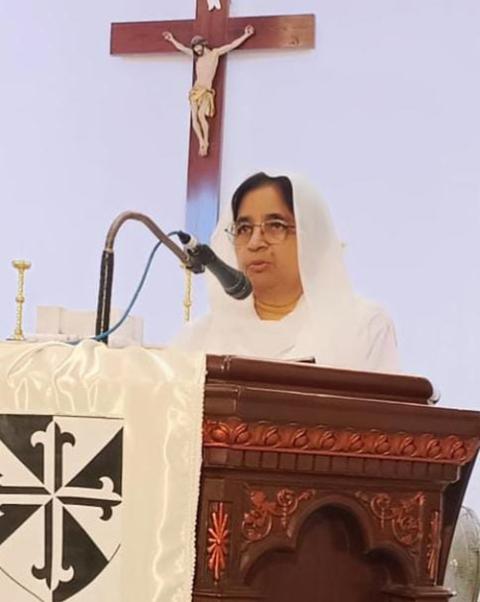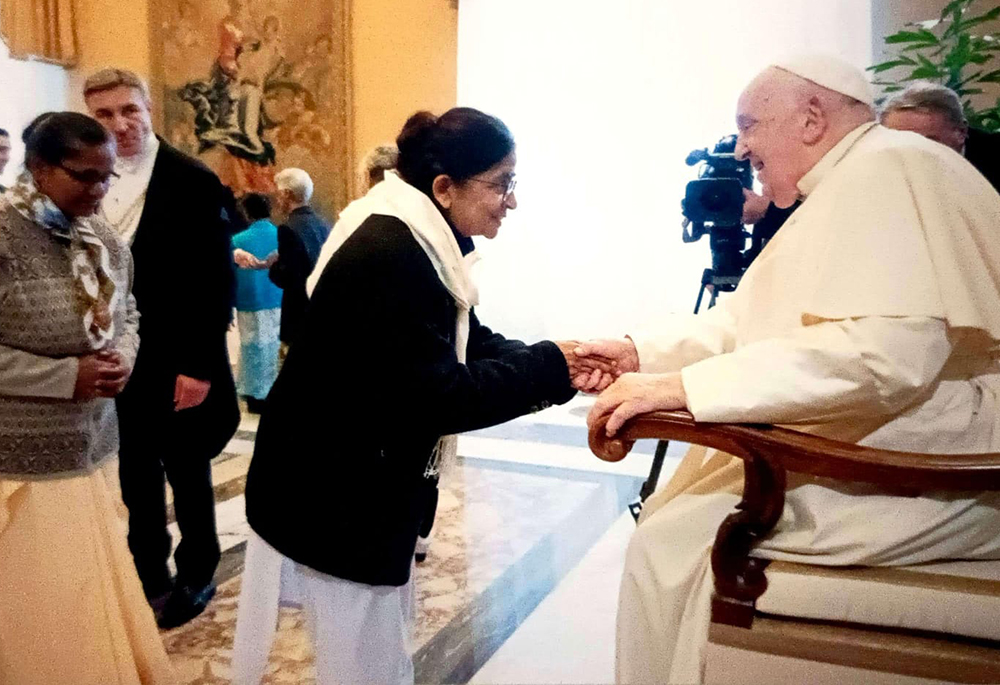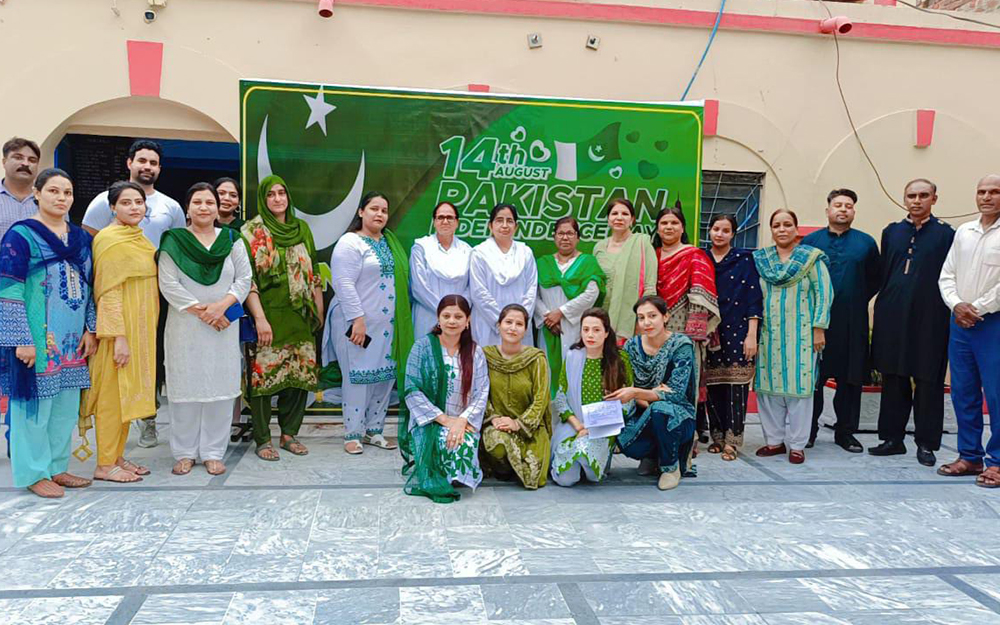
Sr. Nasreen Gian receives a bouquet from grade 10 students at their farewell party at St Mary's Convent School Multan in 2020. (Courtesy of Sr. Nasreen Gian)
Union "St. Catherine of Siena" of School Missionaries Sr. Nasreen Gian has been appointed by the Pakistani government to implement policies to counter terrorism. As a member of the social and behavior change think tank, Gian is the only Christian representative of this joint initiative of the Islamic Research Institute of Islamic International University, Islamabad, and UNICEF Pakistan.
The delegate superior was recommended by Saiban-e-Pakistan, a state initiative under the Paigham-e-Pakistan Centre for Peace, Reconciliation, and Reconstruction Studies and appointed on Dec. 7.

Sr. Nasreen Gian reads Scripture during the feast of St Dominic on Aug. 8 2024, in Rawalpindi, Pakistan. (Courtesy of Sr. Nasreen Gian)
The government of Pakistan introduced the Paigham-e-Pakistan (Message of Pakistan), a fatwa (religious edict), in 2018*. The religious scholars unanimously declared terrorism, suicide attacks and killing someone as haram (forbidden) in Islam.
Its subsidiary, "Saiban-e-Pakistan" (Pakistan's Shelter) aims at providing protection and support to religious minorities in Pakistan.
Gian is the principal of Sacred Heart High School, Westridge in the city of Rawalpindi, which neighbors the capital Islamabad.
After completing grade 10 in Punjab, Gian studied at St. Joseph's College for Women and the University of Karachi. She completed her theological studies and final religious profession in Rome. She professed her final vows in 1990.
Gian spoke to Global Sisters Report about her plans following the appointment.
Global Sisters Report: First of all, congratulations on your selection. Were you expecting it?
Gian: I really did not think about joining such an important group of researchers. Although, I have a passionate feeling about the subject because of having students starting from playgroup to college. I was in fact already involved in the social and behavior change think tank according to my responsibility.
The inclusion in the think tank is just an inclination because of my association with Dominican school missionaries. It has given me a specific platform to learn and evaluate my study in the group of experts to make it enriched objectively.

Sr. Nasreen Gian is pictured with Pope Francis on Dec. 4th 2024, after the chapter of Union "St. Catherine of Siena" of School Missionaries. (Courtesy of Sr. Nasreen Gian)
How does it benefit your ministry and the church in general?
It's a very important circle for a better solution for our students. It aims to monitor and develop laws regarding child rights and child abuse in Pakistan. It suits my vocation and the specific field of education as our congregation runs schools in two dioceses [Faisalabad and Multan] in the province of Punjab which has the largest number of Christians. I'll be able to handle the situations in school in a more appropriate way.
What is the situation of child rights in Pakistan?
It's a challenging question. I mean the psychological, physical and of course the sexual violence is distressing. In my areas of work, I mean the school, I am very worried about the basic rights of children to education. Instead of school, they are sent to work or trapped in early marriages.
I understand this comes as a result of poverty. The families who cannot pay the school fee send the children to earn their livelihood. We have to think much more deeply about how to help people to eliminate poverty and educate parents to find other means to earn enough so that their child starts school.
I have already initiated the opportunities that my students stand on solid ground of confidence by holding the great values of love, understanding, broad mindedness and respect for each other to be happy and guiding others to be happy in school and their homes, which is desperately needed for our society.

Sr. Nasreen Gian (center) celebrates Pakistan's Independence Day on Aug. 14, 2024, with her staff of Sacred Heart High School in Rawalpindi. (Courtesy of Sr. Nasreen Gian)
How do you view prevalent behavior in Pakistani society?
It is certainly not a peaceful or a tolerant society anymore. We may think it's no use to engage with the majority but it is important to attend social gatherings to come closer to things and make things better. We have to avoid keeping to ourselves — go to them, develop an understanding and focus on common points between both religions. Instead of producing Christians or Muslims, the schools should produce trained humans.
Sadly the respect for teachers has also declined these days. Even parents complain to school authorities when their children are punished. Parents need serious motivation and awareness to focus on training their children. It's a dilemma of society.
Are there any programs or initiatives you hope to introduce or strengthen during your tenure?
So far we only had a meeting of 20 academics and researchers this January where I shared challenges of the school-going children. Ignored by their parents, they become stubborn and resist apologizing for their mistakes. They find escape in the world of social media and develop multiple IDs on platforms.
I plan to recommend policies to enroll the dropouts, update primary education and help educators to think at the level of the students.
More than 26 million children are out of school, and according to government figures, most of them live in rural areas where parents prefer sending their children to work and support the family. In villages, families struggle with poverty, early marriages and a lack of schools nearby.
Without systemic change and real investment in rural education, these children will continue to be left behind. The public needs serious awareness about investing in the education of their children.
Advertisement
What legacy would you like to leave through your work on this think tank?
Given my background as an educationist, I wish my students to learn to think. They engage themselves using different strategies as a team work. They improve verbal communication like using polite words as respect for each other and share their talents to make ways toward peace and reconciliation. That's the legacy I wish to leave through my work.
We always use common prayer at our assembly having students of different religions so that they think they are equally accepted and respected. I wish to work about bringing gentle change in their behavior as a whole in order to make them good human beings.
How do you view the significance of Saiban-e-Pakistan and Paigham-e-Pakistan initiative in promoting peace and reconciliation? Why is such a think tank needed?
I am so glad to hear about this initiative promoting peace and reconciliation, which are the basic steps for the progress of Pakistan. It will bring all Pakistanis under the same flag. As a result of this unity, each Pakistani will be a think tank in his or her self, thus developing a positive thinking in our nation. The dream of Paigham-e-Pakistan will become true.
*This story has been updated to clarify the introduction of Paigham-e-Pakistan (Message of Pakistan).








